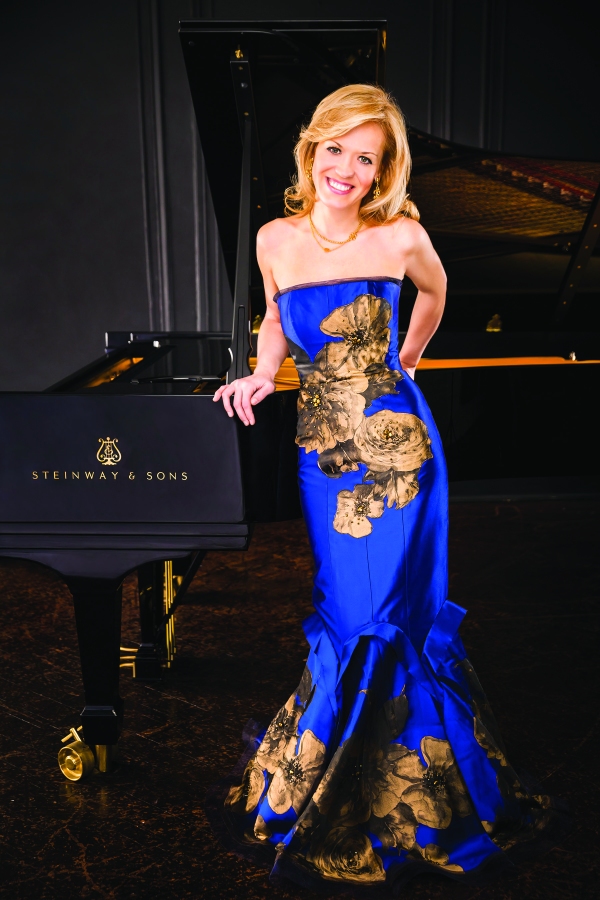A touch of new(er) and old classics from Madison Symphony
If the opening concert of John DeMain’s 24th season with the Madison Symphony Orchestra eschewed a major guest soloist (a DeMain tradition—and not a bad one!), it also stayed far away from major warhorse repertoire. The first of three performances of the season’s second program Friday night in Overture Hall took the other approach to programming.
The soloist was Russian pianist Olga Kern (pictured above, credit Chris Lee), who has quickly become a local favorite (as she is in many cities around the globe). She first arrived here with some Beethoven in 2009, returned a year later with her signature Rachmaninoff in 2010, and returned in 2015 for a second helping of that master. This weekend she brings her substantial gifts to bear on a work that may be just a little underappreciated in America, the Piano Concerto of Samuel Barber.
The piece has always been a personal favorite of yours truly; I was smitten hard by Barber in general in my college years, to the point of writing a long paper about four of his works, which included this concerto. Of course at the time, the work was scarcely more than a decade old: It was commissioned in part for the centennial of Barber’s publisher, and for the opening of the then-Philharmonic Hall at the gestating Lincoln Center in 1962 (of course it’s David Geffen Hall today—after being Avery Fisher Hall for many years!).
But I digress…back to Barber. The early 1960s signaled the heyday of twelve-tone and serial music as a calling card if you were be taken seriously by musical academia, and Barber of course is thoroughly a neo-Romantic. The opening movement of his Piano Concerto seems to want to break free—just a bit—of his usual lyric (and generally tonal) milieu, with its angular motifs, first given out by a pounding soloist without the orchestra. Kern, not surprisingly, knows how to hammer this kind of music effectively, and DeMain had the orchestra responding with its impassioned give and take later in the movement. But even a fan of this piece must be honest and admit that overall the movement is episodic to a fault, and while its sense of the rhapsodic is true to Barber’s typical emotional expression, one could forgive any listeners who were not totally taken in in the first ten minutes.
Ah, but then we come to the beguiling slow movement, borderline Chopinesque in its keyboard lyricism, and unabashedly heart-on-sleeve. It might not reach the heights that Rachmaninoff scales in his slow movements, but certainly this is familiar terrain for Kern, and she had ample opportunity to display the other side of her artistry. As for the finale, it’s just plain fun: A rollicking 5/8 meter bundle of energy that catches its breath with two contrasting episodes, with quirky xylophone and clarinet solos, and a woodwind sectional rich in timbre.
Judging by the audience’s quick rise to its collective feet and the uproarious applause and shouts, one might have thought that Kern and DeMain had just polished off a Romantic warhorse after all. But best of all, the crowd was rewarded for their admiration with an encore true to Kern’s musical roots: a luminous reading of Rachmaninoff’s Moments Musicaux, Op. 16, No. 4.
The evening had begun with a delicate musical appetizer, the “Mother Goose Suite” of Ravel. This quarter-hour is mostly about gauzy strings, chirpy woodwinds, the plucking of a harp; in short, Gallic charm through a fairy-tale prism. A major highlight that was beautifully executed is in the “Conversation of the Beauty and the Beast.” Clarinetist J.J. Koh provided the gleaming, liquid sound for the former, and Carol Rosing made the most of a rare chance to execute the inimitable growls that only a contrabassoon can offer.
The second half of the evening went just as expected, which is to say that DeMain and his collegial band savored every familiar strain of a work they know well, Dvorak’s Symphony No. 9, “From the New World.” It wasn’t that long ago we had the chance to hear the MSO play it, albeit in a slightly different context, the first presentation here of the “Beyond the Score” series produced by the Chicago Symphony. (Two seasons later we were treated to the BTS version of Scheherazade, and on March 18 next year the MSO will “solve” the “Enigma Variations” of Elgar).
In any case, there’s nothing wrong with hearing one of classical music’s “greatest hits,” especially when it’s giving such tender loving care (and the pull-out-all-the-stops treatment when appropriate!). Again, given the relative rarity, and in this case, the fame of the English horn solo in the slow movement, we are happy to give a nod to Jennifer Morgan for her soothingly expressive rendering of her part.
And lest we forget, there were other players who deserve their bows: harpist Johanna Wienholts (one of the new members of the MSO) had a great deal to execute in the Ravel, flutist Stephanie Jutt had a number of wonderful moments as well.
There was one sequence in the Dvorak however that sticks in the memory, one that revealed what is possible when a director such as DeMain sticks around for nearly a quarter-century, and works with mostly the same players for considerable stretches of that time. Near the end of that famous “Goin’ Home” movement in the “New World” Symphony, a handful of strings take over, almost like a mini-chamber group coup. The passage is hushed and when it works—as it did on Friday—you can almost see the audience leaning in slightly, working at soaking up each nuance. Led by concertmaster Naha Greenholtz, with principal cellist Karl Lavine and violist Chris Dozoryst and just two or three more, DeMain and crew ever so carefully tiptoed through the pregnant pauses and half-phrases.
You’ve got two chances left to elevate your weekend with this musical lift, Saturday at 8 pm, and Sunday at 2:30—no football excuses allowed!

